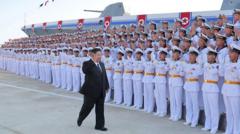Chinese state media have expressed triumph over substantial funding cuts to Voice of America and Radio Free Asia. Critically viewed by Beijing for exposing human rights issues, these outlets face uncertainty following a US executive order aiming to dismantle the agency overseeing them, sparking nationalist reactions and reinforcing Beijing's narrative on foreign influence.
Chinese Nationalists Celebrate US Media Cuts Amid Global Information Crisis

Chinese Nationalists Celebrate US Media Cuts Amid Global Information Crisis
Significant budget reductions to Voice of America and Radio Free Asia have spurred nationalistic sentiments in China, as state media leverage these changes to critique US-backed journalism.
In a surprising turn of events, Chinese state media are reveling in the recent budget cuts that target Voice of America (VOA) and Radio Free Asia (RFA), two prominent US government-funded news organizations. These entities have long been criticized by Beijing for their unflinching coverage of human rights abuses in China, a subject that the ruling Communist Party finds particularly sensitive.
Both VOA and RFA have historically provided vital news coverage to areas where the flow of unbiased information is heavily restricted, notably broadcasting in languages such as Mandarin, Cantonese, Uyghur, and Tibetan. However, the Chinese authorities have relentlessly jammed these transmissions to limit their impact.
Criticism of the US-based outlets reached a new height in the wake of a recent executive order signed by President Trump aimed at dismantling the Agency for Global Media— the very federal entity responsible for overseeing these organizations. In the aftermath, staff members at VOA were reportedly informed of paid leave as their futures remain uncertain; meanwhile, RFA faced immediate withdrawal of federal funding.
State-run media such as the Global Times wasted no time in celebrating these developments. Branding VOA as "a frontline propaganda tool" and accusing it of being a "lie factory,” the publication indicated that many inaccuracies regarding China trace back to VOA's reporting. An editorial published by the newspaper highlighted what it termed as biased storytelling on topics like Taiwan, Hong Kong protests, and the ongoing coronavirus pandemic.
As the situation unfolds, the ability of these US-funded news outlets to operate effectively and continue delivering accurate information to audiences within China is now clouded with ambiguity, igniting a fresh wave of nationalist pride in Beijing.






















